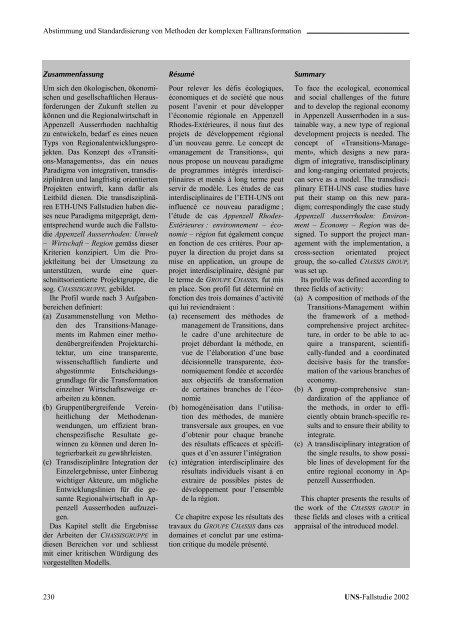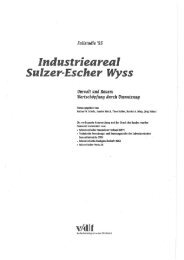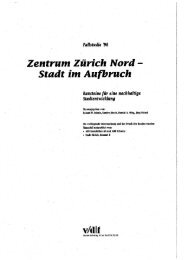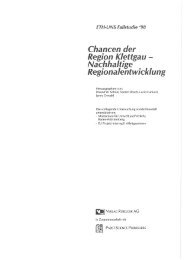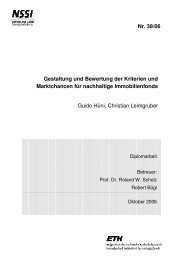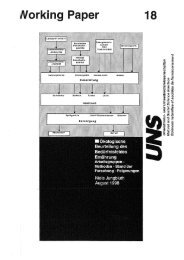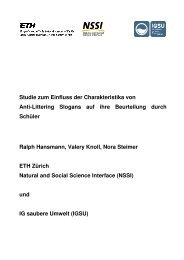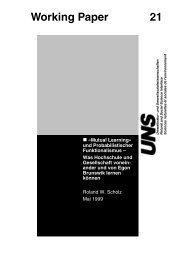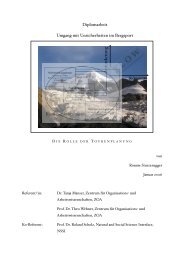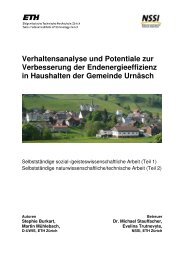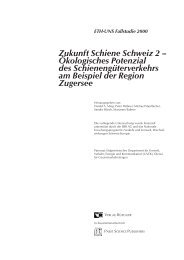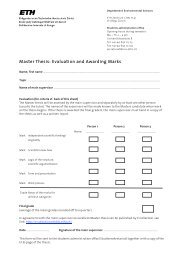Appenzell Ausserrhoden - ETH Zurich - Natural and Social Science ...
Appenzell Ausserrhoden - ETH Zurich - Natural and Social Science ...
Appenzell Ausserrhoden - ETH Zurich - Natural and Social Science ...
Sie wollen auch ein ePaper? Erhöhen Sie die Reichweite Ihrer Titel.
YUMPU macht aus Druck-PDFs automatisch weboptimierte ePaper, die Google liebt.
Abstimmung und St<strong>and</strong>ardisierung von Methoden der komplexen Falltransformation<br />
Zusammenfassung<br />
Um sich den ökologischen, ökonomischen<br />
und gesellschaftlichen Herausforderungen<br />
der Zukunft stellen zu<br />
können und die Regionalwirtschaft in<br />
<strong>Appenzell</strong> <strong>Ausserrhoden</strong> nachhaltig<br />
zu entwickeln, bedarf es eines neuen<br />
Typs von Regionalentwicklungsprojekten.<br />
Das Konzept des «Transitions-Managements»,<br />
das ein neues<br />
Paradigma von integrativen, transdisziplinären<br />
und langfristig orientierten<br />
Projekten entwirft, kann dafür als<br />
Leitbild dienen. Die transdisziplinären<br />
<strong>ETH</strong>-UNS Fallstudien haben dieses<br />
neue Paradigma mitgeprägt, dementsprechend<br />
wurde auch die Fallstudie<br />
<strong>Appenzell</strong> <strong>Ausserrhoden</strong>: Umwelt<br />
– Wirtschaft – Region gemäss dieser<br />
Kriterien konzipiert. Um die Projektleitung<br />
bei der Umsetzung zu<br />
unterstützen, wurde eine querschnittsorientierte<br />
Projektgruppe, die<br />
sog. CHASSISGRUPPE, gebildet.<br />
Ihr Profil wurde nach 3 Aufgabenbereichen<br />
definiert:<br />
(a) Zusammenstellung von Methoden<br />
des Transitions-Managements<br />
im Rahmen einer methodenübergreifenden<br />
Projektarchitektur,<br />
um eine transparente,<br />
wissenschaftlich fundierte und<br />
abgestimmte Entscheidungsgrundlage<br />
für die Transformation<br />
einzelner Wirtschaftszweige erarbeiten<br />
zu können.<br />
(b) Gruppenübergreifende Vereinheitlichung<br />
der Methodenanwendungen,<br />
um effizient branchenspezifische<br />
Resultate gewinnen<br />
zu können und deren Integrierbarkeit<br />
zu gewährleisten.<br />
(c) Transdisziplinäre Integration der<br />
Einzelergebnisse, unter Einbezug<br />
wichtiger Akteure, um mögliche<br />
Entwicklungslinien für die gesamte<br />
Regionalwirtschaft in <strong>Appenzell</strong><br />
<strong>Ausserrhoden</strong> aufzuzeigen.<br />
Das Kapitel stellt die Ergebnisse<br />
der Arbeiten der CHASSISGRUPPE in<br />
diesen Bereichen vor und schliesst<br />
mit einer kritischen Würdigung des<br />
vorgestellten Modells.<br />
Résumé<br />
Pour relever les défis écologiques,<br />
économiques et de société que nous<br />
posent l’avenir et pour développer<br />
l’économie régionale en <strong>Appenzell</strong><br />
Rhodes-Extérieures, il nous faut des<br />
projets de développement régional<br />
d’un nouveau genre. Le concept de<br />
«management de Transitions», qui<br />
nous propose un nouveau paradigme<br />
de programmes intégrés interdisciplinaires<br />
et menés à long terme peut<br />
servir de modèle. Les études de cas<br />
interdisciplinaires de l’<strong>ETH</strong>-UNS ont<br />
influencé ce nouveau paradigme ;<br />
l’étude de cas <strong>Appenzell</strong> Rhodes-<br />
Extérieures : environnement – économie<br />
– région fut également conçue<br />
en fonction de ces critères. Pour appuyer<br />
la direction du projet dans sa<br />
mise en application, un groupe de<br />
projet interdisciplinaire, désigné par<br />
le terme de GROUPE CHASSIS, fut mis<br />
en place. Son profil fut déterminé en<br />
fonction des trois domaines d’activité<br />
qui lui reviendraient :<br />
(a) recensement des méthodes de<br />
management de Transitions, dans<br />
le cadre d’une architecture de<br />
projet débordant la méthode, en<br />
vue de l’élaboration d’une base<br />
décisionnelle transparente, économiquement<br />
fondée et accordée<br />
aux objectifs de transformation<br />
de certaines branches de l’économie<br />
(b) homogénéisation dans l’utilisation<br />
des méthodes, de manière<br />
transversale aux groupes, en vue<br />
d’obtenir pour chaque branche<br />
des résultats efficaces et spécifiques<br />
et d’en assurer l’intégration<br />
(c) intégration interdisciplinaire des<br />
résultats individuels visant à en<br />
extraire de possibles pistes de<br />
développement pour l’ensemble<br />
de la région.<br />
Ce chapitre expose les résultats des<br />
travaux du GROUPE CHASSIS dans ces<br />
domaines et conclut par une estimation<br />
critique du modèle présenté.<br />
Summary<br />
To face the ecological, economical<br />
<strong>and</strong> social challenges of the future<br />
<strong>and</strong> to develop the regional economy<br />
in <strong>Appenzell</strong> <strong>Ausserrhoden</strong> in a sustainable<br />
way, a new type of regional<br />
development projects is needed. The<br />
concept of «Transitions-Management»,<br />
which designs a new paradigm<br />
of integrative, transdisciplinary<br />
<strong>and</strong> long-ranging orientated projects,<br />
can serve as a model. The transdisciplinary<br />
<strong>ETH</strong>-UNS case studies have<br />
put their stamp on this new paradigm;<br />
correspondingly the case study<br />
<strong>Appenzell</strong> <strong>Ausserrhoden</strong>: Environment<br />
– Economy – Region was designed.<br />
To support the project management<br />
with the implementation, a<br />
cross-section orientated project<br />
group, the so-called CHASSIS GROUP,<br />
was set up.<br />
Its profile was defined according to<br />
three fields of activity:<br />
(a) A composition of methods of the<br />
Transitions-Management within<br />
the framework of a methodcomprehensive<br />
project architecture,<br />
in order to be able to acquire<br />
a transparent, scientifically-funded<br />
<strong>and</strong> a coordinated<br />
decisive basis for the transformation<br />
of the various branches of<br />
economy.<br />
(b) A group-comprehensive st<strong>and</strong>ardization<br />
of the appliance of<br />
the methods, in order to efficiently<br />
obtain branch-specific results<br />
<strong>and</strong> to ensure their ability to<br />
integrate.<br />
(c) A transdisciplinary integration of<br />
the single results, to show possible<br />
lines of development for the<br />
entire regional economy in <strong>Appenzell</strong><br />
<strong>Ausserrhoden</strong>.<br />
This chapter presents the results of<br />
the work of the CHASSIS GROUP in<br />
these fields <strong>and</strong> closes with a critical<br />
appraisal of the introduced model.<br />
230 UNS-Fallstudie 2002


